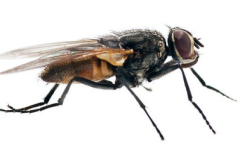FLIES

Domestic flies, often called “Filth Flies,” are not only a nuisance by their presence; House flies may spread diseases such as conjunctivitis, poliomyelitis, typhoid fever, tuberculosis, anthrax, leprosy, cholera, diarrhea and dysentery. Flies often are the main reason for cholera and dysentery epidemics. But even under normal conditions, children and elderly are at a greater risk of conducting more common diseases such as salmonella food poisoning from fly contaminated food. Commonly noticed flies in India include House Fly, Drain Fly, Fruit Fly, Flesh Fly and Blue Bottle Fl
JV Care’s fly control program includes
• Thorough inspections to identify breeding, feeding and resting sites
• Spray treatment of adult flies resting areas.
• Fogging, Misting and baiting to control adult flies.
• Larviciding to kill breeding source.
• Fly Bags-It’s great attract lure for trapping flies.
Flies Facts
On average, the adult housefly will live for around 30 days. They go through a complete four-stage cycle that consists of egg, larva, pupa and adult stages.
• House fly can survive from 30 to 60 days.
• House flies are able to move their wings 200 times per second and it can speed of 5 miles per hour.
• House fly relies mostly on the sense of smell when it searches for food. Sense of smell is located in the antennas.
• House fly eats sugary liquids and different kinds of organic waste. All food needs to be turned into liquid before ingestion because fly does not have teeth and ability to chew food. House fly spits digestive juices on the food to decompose it before swallowing.
• House flies are active during the day. They rest during the night
• Common house flies are attracted to decaying organic waste such as faeces and rotting meat, whereas fruit flies will look for sugary substances and feed more commonly on overripe fruit, spilled soft drinks and alcohol.
• Flies spread diseases because of their breeding and feeding habits. Bacteria from where the fly usually feed on would get stuck on their mouth parts and footpads eventually spreading onto places they land on. Imagine if it’s exposed food that you are about to eat.
Flies Prevention Tips
Deny flies access – keep windows and doors closed.
• Sanitation is the most effective and important step in controlling flies. All outside trash areas must be kept clean.
• Flyscreen’s – fit flyscreen’s to windows especially around kitchen and waste areas.
• Cover food – flies spread diseases by landing on food before we eat it.
• Clear away – clear food debris and liquid spillages from food consumption and preparation areas, under kitchen benches and appliances.
• Dustbins / Compost bins – ensure all waste containers have tightly sealed lids.
• Floor mats – ensure that build-up of grease is thoroughly cleaned every month.
• Pets – clean up after pets. Not only are faeces a perfect breeding place for flies, they may land there before landing on your food.
• Clear up dead flies – they provide a tasty snack for other pests such as carpet beetles.
• Water storage – cover these with well fitted lids.
• Standing water – do not leave standing water (in watering cans and pot plants for example) as this offers mosquitoes opportunity to breed.
• Ponds – if you have a garden pond, introduce goldfish as they will eat mosquito larvae.
• Drains – ensure drains are kept clean and free of debris to reduce fly breeding sites.
